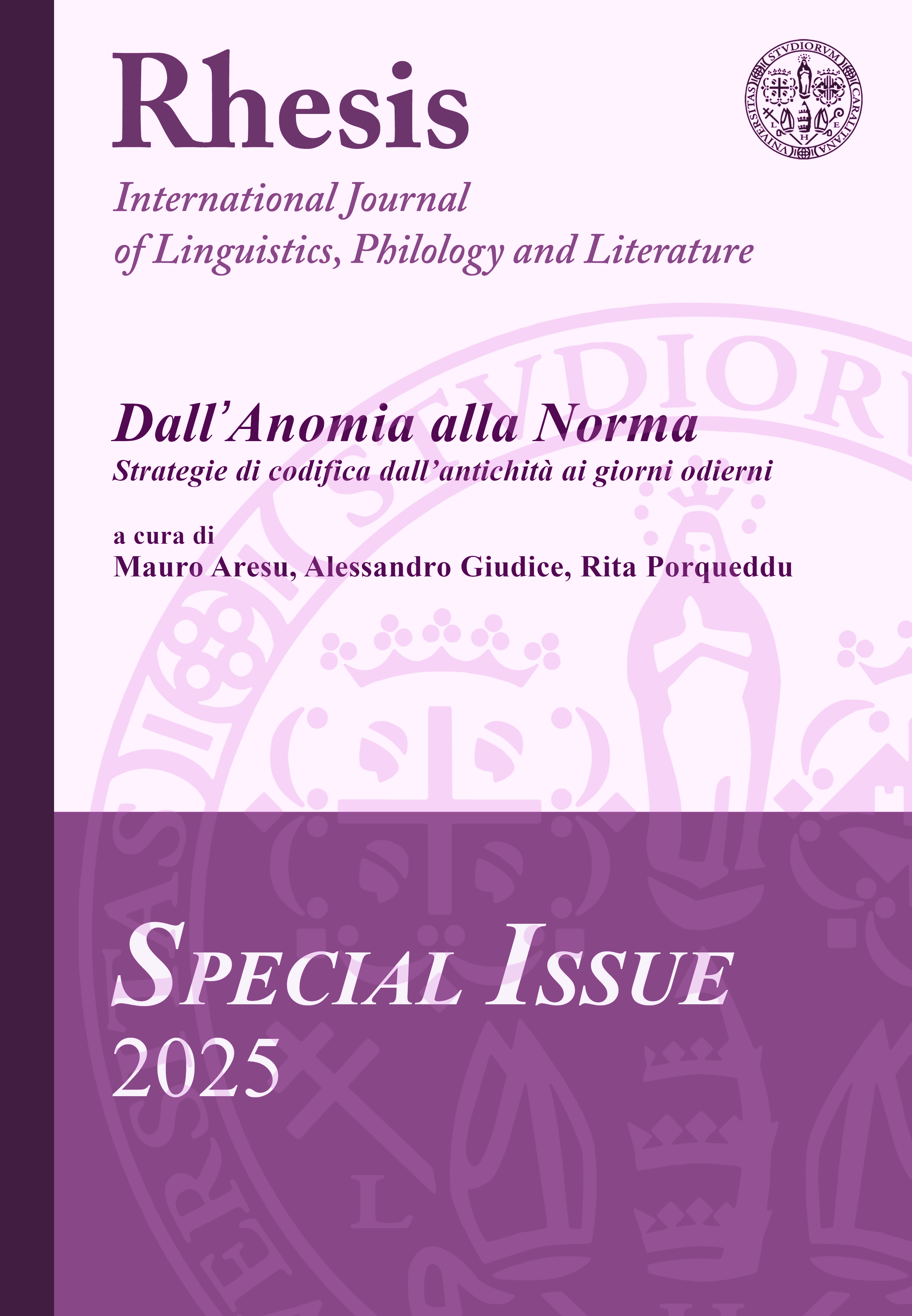Re-evaluating the Roman orator’s rules through the lens of (im)politeness
Abstract
This paper examines select passages from De Oratore and Cicero’s post reditum speeches using pragmatic and politeness theories. By applying these analytical tools to Cicero’s rhetorical and oratorical works, we can re-evaluate the rules for the ideal orator and the expressive strategies present in the speeches that have come down to us. Rhetorical treatises, indeed, set out the linguistic norms that govern interactions in public contexts where codified conflict takes place and provide guidelines on the correct way to formulate linguistic acts – even potentially aggressive ones – permitted within those contexts. In concrete communicative exchanges, speakers are primarily influenced by the need to conform to the expected linguistic behaviour dictated by the public arenas of the Roman Republic. Only subsequently, they must balance personal objectives: engaging the audience emotionally without causing unintended offense, maintaining their own dignitas, and strategically attacking that of the opponents, when necessary.
Downloads
References
Achard, Guy (1981), Pratique rhétorique et idéologie politique dans les discours optimates de Cicéron, Leiden, Brill.
Adams, John. N. (1978), ‘Conventions of Naming in Cicero’, Classical Quarterly 28 (1), 145-166.
Barrios-Lech, Peter (2016), Linguistic Interaction in Roman Comedy, Cambridge, Cambridge University Press.
Benveniste, Émile (1948-1949), ‘Don et échange dans le vocabulaire indo-européen’, L’Année sociologique 3, 7-20.
Berger, Łukasz; Unceta Gómez, Luis (eds.) (2022), Politeness in Ancient Greek and Latin, Cambridge, Cambridge University Press.
Brown, Penelope; Levinson, Stephen C. (1987), Politeness. Some Universals in Language Usage, Cambridge, Cambridge University Press.
Clark, Herbert H.; Gerrig, Richard. J. (1984), ‘On the pretense theory of irony’, Journal of Experimental Psychology: General 113 (1), 121-126.
Condello, Federico (2004), ‘I nomi del nemico. Appunti sul lessico classico’, in Griseldaonline 4, <https://site.unibo.it/griseldaonline/it/approfondimenti/federico-condello-nomi-nemico> (ultima consultazione: 20/02/2025).
Corbeill, Anthony (1996), Controlling Laughter. Political Humor in the Late Roman Republic, Princeton, Princeton University Press.
Culpeper, Jonathan (1996), ‘Towards an Anatomy of Impoliteness’, Journal of Pragmatics 25 (3), 349-367.
Culpeper, Jonathan (2011), Impoliteness Using Language to Cause Offence, Cambridge, Cambridge University Press.
Dickey, Eleanor (2002), Latin Forms of Address: From Plautus to Apuleius, Oxford, Oxford University Press.
Epstein, David F. (1987), Personal Enmity in Roman Politics 218-43 B.C., London, Croom Helm.
Garcés-Conejos Blitvich, Pilar (2010), ‘A genre approach to the study of impoliteness’, International Review of Pragmatics 2 (1), 46-94.
Goffman, Erving (1967), Interaction Ritual. Essays on Face-to-Face Behavior, New York, Doubleday.
Grice, Paul (1975), ‘Logic and conversation’, in Cole, Peter; Morgan, Jerry (eds.), Speech Acts, vol. III, Syntax and Semantics, New York, Academic Press, 41-58.
Grillo, Luca (2018), ‘Irony in Cicero’s post reditum Speeches’, in Lauwers, Jeroen; Schwall, Hedwig; Opsomer, Jan J (eds.), Psychology and the Classics: A Dialogue of Disciplines, Berlin-Boston, De Gruyter, 207-222.
Hall, Jon (2009), Politeness and Politics in Cicero’s Letters, Oxford, Oxford University Press.
Harris, Sandra (2001), ‘Being Politically Impolite: Extending Politeness Theory to Adversarial Political Discourse’, Discourse Society 12 (4), 451-472.
Haugh, Michael (2008), ‘Intention in pragmatics’, Intercultural Pragmatics 5 (2), 99-110.
Iurescia, Federica (2019), Credo iam ut solet iurgabit. Pragmatica della lite a Roma, Göttingen, Vandenhoeck & Ruprecht.
Jucker, Andreas H. (2024), ‘Conduct politeness versus etiquette politeness: a terminological distinction’, Journal of Politeness Research 20 (1), 87-109.
Lakoff, Robin (1989), ‘The limits of politeness: therapeutic and courtroom discourse’, Multilingua 8 (2-3), 101-130.
Lausberg, Heinrich (1969), Elementi di retorica, Bologna, Il Mulino.
Leech, Geoffrey (1983), Principles of Pragmatics, London, Longman.
Leech, Geoffrey (2014), The Pragmatics of Politeness, New York, Oxford University Press.
Lendon, Jon E. (1997), Empire of Honour: The Art of Government in the Roman World, Oxford, Clarendon Press.
Lentano, Mario (2005), ‘Il dono e il debito. Verso un’antropologia del beneficio nella cultura romana’, in Haltenhoff, Andreas; Heil, Andreas; Mutschler, Fritz-Heiner (eds.), Römische Werte als Gegenstand der Altertumswissenschaft, Berlin-Boston, Teubner, 125-142.
Locher, Miriam A.; Watts, Richard J. (2008), ‘Relational work and impoliteness: Negotiating norms of linguistic behaviour’, in Bousfield, Dereck; Locher, Miriam A. (eds.), Impoliteness in Language. Studies on its Interplay with Power in Theory and Practice, Berlin, Mouton de Gruyter, 77-99.
Opelt, Ilona (1965), Die lateinischen Schimpfwörter und verwandte sprachliche Erscheinungen. Eine Typologie, Heidelberg, Winter.
Otto, August (1890), Die Sprichwörter und sprichwörtlichen Redensarten der Römer, Leipzig, Teubner.
Picone, Giusto (ed.) (2008), Clementia Caesaris: modelli etici, parenesi e retorica dell’esilio, Palermo, G.B. Palumbo.
Picone, Giusto; Beltrami, Lucia; Ricottilli, Licinia (eds.) (2009), Benefattori e beneficati: la relazione asimmetrica nel de beneficiis di Seneca, Palermo, G.B. Palumbo.
Raccanelli, Renata (2012), Cicerone, Post reditum in senatu e ad Quirites. Come disegnare una mappa di relazioni, Bologna, Pàtron.
Ricottilli, Licinia (2009), ‘Appunti sulla pragmatica della comunicazione e della letteratura latina’, Studi italiani di filologia classica, supplemento al volume VII, quarta serie (1), 121-170.
Unceta Gómez, Luis (2018), ‘Gli studi sulla (s)cortesia linguistica in latino. Possibilità di analisi e proposte per il futuro’, SSL 56 (2), 9-37.
Unceta Gómez, Luis (2019), ‘Conceptualizations of linguistic politeness in Latin. The emic perspective’, Journal of Historical Pragmatics 20 (2), 286-312.
Unceta Gómez, Luis (2022), ‘Being Polite the Roman Way: Comments about Im/Politeness in the Comedies of Plautus and Terence’, in Berger, Łukasz; Unceta Gómez, Luis (eds.), Politeness in Ancient Greek and Latin, Cambridge, Cambridge University Press, 295-316.
Uría, Javier (2006), ‘Personal names and invective in Cicero’, in Maltby, Robert; Booth, Joan (eds.), What’s in a Name? The Significance of Proper Names in Latin Literature, Swansea, The Classical Press of Wales, 13-31.
Watts, Richard J. (2003), Politeness, Cambridge, Cambridge University Press.
Watts, Richard J. (2005) [1992], ‘Linguistic politeness and politic verbal behaviour: Reconsidering claims for universality’, in Watts, Richard J.; Ide, Sachiko; Ehlich, Konrad (eds.), Politeness in Language: Studies in its History, Theory and Practice, Berlin-New York, Mouton de Gruyter, 43-70.
Wiseman, T. Peter (1985), ‘Competition and Co-Operation’, in Wiseman, T. Peter (ed.), Roman Political Life 90 B.C. to A.D. 69, Exeter, University of Exeter Press, 3-19.



